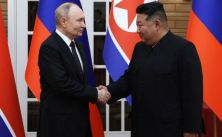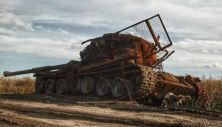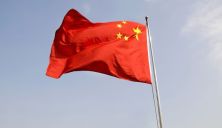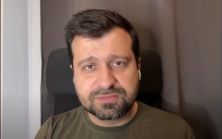Canada and South Korea condemned the military cooperation between the DPRK and Russia, and called on Moscow to immediately and completely withdraw...
Vous n'êtes pas connecté
- English
- Français
- عربي
- Español
- Deutsch
- Português
- русский язык
- Català
- Italiano
- Nederlands, Vlaams
- Norsk
- فارسی
- বাংলা
- اردو
- Azərbaycan dili
- Bahasa Indonesia
- Հայերեն
- Ελληνικά
- Bosanski jezik
- українська мова
- Íslenska
- Türkmen, Түркмен
- Türkçe
- Shqip
- Eesti keel
- magyar
- Қазақ тілі
- Kalaallisut ; kalaallit oqaasii
- Lietuvių kalba
- Latviešu valoda
- македонски јазик
- Монгол
- Bahasa Melayu ; بهاس ملايو
- ဗမာစာ
- Slovenščina
- тоҷикӣ ; toğikī ; تاجیکی
- ไทย
- O'zbek ; Ўзбек ; أۇزبېك
- Tiếng Việt
- ភាសាខ្មែរ
- རྫོང་ཁ
- Soomaaliga ; af Soomaali
Rubriques :
 Maroc - EURASIAREVIEW.COM - A la une - 27/Sep 23:30
Maroc - EURASIAREVIEW.COM - A la une - 27/Sep 23:30
Ukraine’s Argument For Striking Back – Analysis
By Maria Avdeeva (FPRI) — On a sunny Sunday afternoon, August 30, Russia launched five glide bombs toward Kharkiv. One bomb obliterated the entrance of a twelve-story residential building, where a seventy-one-year-old burned alive. Another killed a fourteen-year-old girl sitting on a bench in a park, leaving six people dead in total. In September, Russia began showering Kharkiv with deadly glide bombs almost daily, most targeting densely populated residential areas. These bombs were launched from fighter jets just across the border in Russia’s Belgorod region, leaving Kharkiv residents no chance to take cover because of its close proximity. These brutal assaults have turned Kharkiv into a symbol of daily terror but also a powerful emblem of Ukraine’s resilience, underscoring with brutal clarity that limiting Ukraine’s use of Western-supplied weapons is neither viable nor effective. As Russia escalates its aggression, the question is no longer whether Ukraine should be allowed to strike deep into Russian territory, but when. The time to lift restrictions on Ukraine’s use of Western-supplied weapons to target Russia’s military infrastructure is long overdue. During his visit to the United States, Ukrainian President Volodymyr Zelensky will likelypushto secure guarantees before the upcoming US elections, “while all the officials who want the victory of Ukraine are in official positions.” Among Kyiv’s urgent requests is theability to useBritish, French, and Italian Storm Shadow missiles, as well as US-made Army Tactical Missile System (ATACMS) to strike airbases and other critical military targets inside Russia. Speaking fromaboard a planeen route to a Pennsylvania ammunition factory producing some of Ukraine’s most urgently needed munitions, Zelensky announced that he is to present a victory plan to President Joe Biden and other Western leaders. A week earlier, Russia’s representative to the United Nations, Vassily Nebenzia, issued anultimatum. Any decision by NATO countries to allow Ukraine to use long-range weapons to strike inside Russia would be seen as a direct act of war by NATO against Russia. “The facts are that NATO will be a direct party to hostilities against a nuclear power,” Nebenzia warned. His remarks echoedearlier threatsmade by Russian President Vladimir Putin, who has repeatedly claimed that such an agreement would mark NATO’s formal entry into the war. Russia has consistently employedreflexive control tactics, leveraging threats and diplomatic manipulations to sway Western decision-making. This strategy relies ondeliberately ambiguousnuclear warnings to amplify perceived danger. By playing on the fear of escalation, Russia seeks to undermine Western resolve and restrain support for Kyiv at pivotal junctures. As the war approaches its third year anniversary, the challenges in Ukraine are expected togrow“deeper and harsher,” especially heading into late 2025 and beyond. The current policy of restraint is becoming increasingly outdated and counterproductive. Lifting the ban on Ukraine striking deep into Russian territory is not only long overdue—it is crucial for several key reasons. The Escalation Argument Has Lost its Power One of the primary reasons the West has maintained the restriction on Ukraine using Western weapons to strike inside Russia has been thefear of escalation. NATO countries, particularly the United States, have been cautious about actions that could be interpreted as direct involvement in the war. The Biden administration has repeatedly emphasized its goal: helping Ukraine defend itselfwithout triggeringa broader NATO-Russia conflict. However, the reality is that escalation has already happened, and much of it has been initiated by Russia. Moscow has systematically broadened the scope of the war by acquiring more advanced weaponry, includingIranian ballistic missiles, and ramping up its strikes on Ukrainian cities, energy infrastructure, and civilian targets. Recent missile and glide bomb attacks launched from Russian territory into Ukraine—especially the daily bombardments of Kharkiv—demonstrate Russia’s increasing aggression. One of the deadliest attacks, the bombing of Kharkiv’s Epicenter home improvement store and the Factor Druk printing house in May 2024, highlighted the growing destruction and sophistication of Moscow’s campaign. Russia’s arsenal now also includes supplies from North Korea, withreports confirmingballistic missile shipments. These were used in assaults such as the August 18 attack on Kyiv. Meanwhile, Moscow continues todevastateUkraine’s energy infrastructure, targeting its capacity to generate electricity and heating ahead of the winter months. The systematic destruction of Ukraine’s energy system, which began intensifying in the spring of 2024, has already wiped out over two-thirds of Ukraine’s generation capacity. The coming winter threatens to be themost difficultyet for Ukraine’s energy sector, as Russia’s ongoing strikes continue to destabilize the country. In this context, the argument that Ukraine should avoid striking inside Russia to prevent escalation rings increasingly hollow. Russia is already escalating. Limiting Ukraine’s ability to respond effectively only weakens its defense and emboldens Moscow. In reality, none of the steps the West has already taken—or is considering doing—would trigger a nuclear response based on Russia’s own nuclear doctrine. By that same doctrine, however, Ukraine’s recent incursion into Russia’s Kursk region could have generated a nuclear response, as it constituted an attack on what Russia considers its territorial integrity. In fact, someexperts suggestthat Ukraine’s offensive in Kursk was partly intended to send a message to the West: Putin’s so-called red lines can be crossed without provoking major retaliation, such as nuclear strikes. The move aimed to expose Russia’s nuclear threats as bluster and push Western countries to recognize that many of these threats are hollow. A Shift in Western Thinking While the United States has eased some restrictions amid the renewed Russian offensive on Kharkiv in May 2024, allowing Ukraine to carry outlimited cross-border strikesusing American-supplied weapons, longer-range systems capable of hitting deeper into Russia remain off-limits. Overall, Western support for Ukraine is stilllimited and uncertain. However, this policy may be shifting. Zelensky hasconsistently pushedfor permission to target Russian military sites inside Russia, arguing that such strikes are crucial to degrading Russia’s war-making capacity. US officials, including Secretary of State Antony Blinken, haveacknowledgedthat Russia’s escalation, particularly its use of Iranian missiles, represents a significant shift. During his visit to Kyiv, Blinkennotedthat Putin is the one driving the escalation. By acquiring and deploying increasingly advanced weapons, Russia has forced Ukraine’s allies to reconsider their cautious approach. If Moscow is receiving outside help to enhance its military capabilities, then Ukraine must be allowed to respond with greater force and flexibility. As Russia mounts its pressure in the east, especially near the key logistical hub of Pokrovsk, Ukraine and its western allies arediscussing“what more might be necessary” to help Kyiv on the battlefield beyond trying to hold the frontline. In remarks apparently directed at White House, UK foreign secretary David LammysaysKyiv’s allies need to show “nerve and guts.” This growing recognition reflects a broaderunderstandingthat new aid packages alone cannot win a war, especially when the enemy continues to escalate. To make Putin realize that his invasion is doomed to fail, US and European leaders must adopt a more comprehensive, long-term strategy. If the West is truly committed to helping Ukraine deliver adecisive blow to Russia—rather than simply prolonging the fight “as long as it takes”—lifting restrictions on striking Russian military targets is essential. The Strategic Value of Striking Inside Russia Allowing Ukraine to strike key military sites deep within Russia would significantly change the war’s trajectory. The Institute for the Study of War estimates that Ukraine could target at least245 known military siteswithin the limited range of ATACMS missiles, including airfields used for launching missiles and glide bombs, as well as crucial supply depots and weapons factories—key components of Russia’s military infrastructure. Disrupting these logistical hubs would significantly weaken Russia’s ability to sustain its offensive against Ukraine. Until now, Moscow has operated with relative impunity, launching attacks from its territory with little fear of retaliation. While Ukraine has carried out some successful drone strikes on Russian airfields and ammunition depots, these efforts have been limited compared to the potential impact of Western-supplied long-range weapons. Targeting these critical locations would force Moscow to divert resources to defend its own territory, thereby easing pressure on Ukrainian front lines. This shift could also have a psychological impact, making the war feel more immediate for the Russian population, potentially eroding domestic support for the Kremlin’s aggression. By stretching Russia’s military resources and disrupting its war machine, this shift could bring Ukraine closer to achieving aposition of strength—and force Moscow to reconsider its aggressive tactics. Sufficient long-range capabilities could “change the courseof the war and make Russia seek peace.” The war in Ukraine has reached a critical turning point, and the old arguments for restricting Ukraine’s use of Western-supplied weapons no longer hold. By empowering Ukraine to strike at the heart of Russia’s military infrastructure, the West can significantly bolster Ukraine’s defensive capabilities and reshape the war’s dynamics. The stakes couldn’t be higher, and time is running short. AsZelensky has statedstarting his visit to the United States: “This fall will determine what comes next in this war. Together with our partners, we can secure the positions necessary for our victory—our shared victory—and for a truly just peace.” About the author: Maria Avdeeva is a Non-Resident Senior Fellow in the Eurasia Program at the Foreign Policy Research Institute. She is Research Director at the European Expert Association in Ukraine. She focuses on international security, Ukraine-EU relations and emerging security challenges. In addition, she analyses information operations, efforts to counter disinformation, and threats to democracy. Source: This article was published by FPRI
Articles similaires
North Korea Joins Russia In Ukraine War – Analysis
Russia’s recent mutual defence treaty with North Korea and subsequent ratification by Russia’s State Duma, the lower House of the country’s...
In past month, Russia loses over $2.7B worth of military hardware on battlefield – MoD Ukraine
In October, the Ukrainian Defense Forces destroyed Russian weapon systems and military equipment worth a total of more than $2.7 billion. This was...
China sees no threat in deepening of military cooperation between Russia, N. Korea
China sees no threats in the deepening of cooperation, including in defense, between Russia and North Korea, believing that the two countries have...
Olaf Sholz And His Party “Betrayed Ukraine”. Interview with Serhii Sumlenny
In the interview we ask the German expert Serhii Sumlenny about why and who sabotages the aid to Ukraine, and does not believe in Ukrainian...
Russia-Ukraine war: List of key events, day 993 | Russia-Ukraine war News
As the war enters its 993rd day, these are the main developments. Here is the situation on Thursday, November 14: Fighting Ukrainian forces have...
NATO should send clear message to Russia by inviting Ukraine – Lithuanian DM
Inviting Ukraine to join the North Atlantic Alliance would show Russia, which understands only force, that it has no veto over the actions of its...
Arms shortage, not lack of financing hampering supplies to Ukraine – German government spox
The supply of western weapons to Ukraine depends not so much on the financial side of the case, but on the availability of appropriate...
Arms shortage, not lack of financing hampering supplies to Ukraine – German government spox
The supply of western weapons to Ukraine depends not so much on the financial side of the case, but on the availability of appropriate...
Moscow Prescribes Own Terms For Talks With Trump On Ukraine – Analysis
By Vladimir Socor Moscow is in no hurry to hold talks with US President-elect Donald Trump on halting Russia’s war in Ukraine. The Kremlin...
Les derniers communiqués
-
Adobe Brings Conversational AI to Trillions of PDFs with the New AI Assistant in Reader and Acrobat
Adobe - 21/02/2024
-
Laura Frigenti takes the Helm as Chief Executive Officer of the Global Partnership for Education
Global Partnership for Education - 05/12/2022





